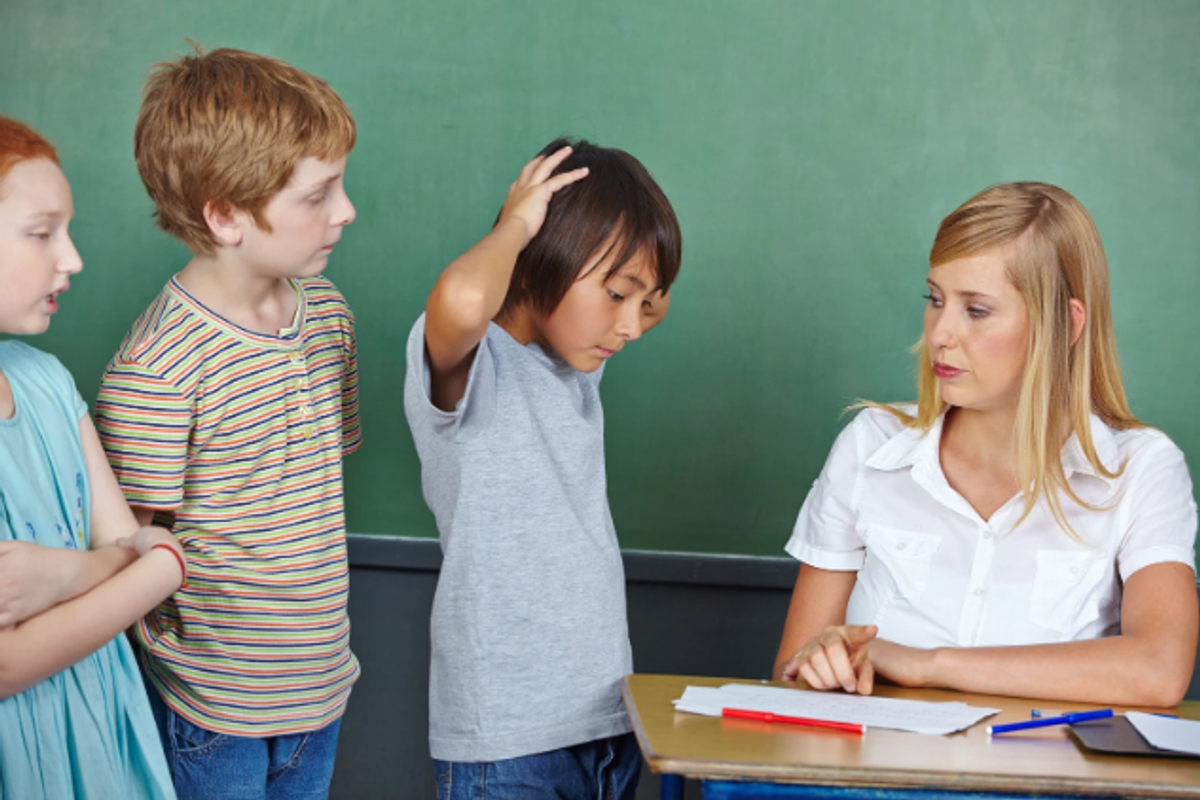Teacher stirs 'controversy' by being brutally honest with students about their reading level
"I think some students need that in order to push themselves to actually try in school."
A teacher showing her students their grades.
Remember in school when the teacher would split the class into different reading groups? One was always, clearly, more advanced; while the other went at a slower pace. But the groups usually weren't labeled as such out loud.
One teacher, at least, says maybe they should be.
The results from 2024’s National Assessment of Educational Progress found that the slide in American students' reading abilities has only worsened. The percentage of 8th graders with “below basic” reading skills was 33%, the lowest in the exam’s three-decade history. The percentage of fourth graders “below basic” was the largest in 20 years, 40%.
“Our lowest performing students are reading at historically low levels,” said Peggy Carr, commissioner of the National Center for Education Statistics, which gives the NAEP exam. “We need to stay focused in order to right this ship.”
A big reason for the drop was the disruption in education caused by the COVID-19 pandemic, but educators are looking to see if there are other causes behind the drop in competency. “This is a major concern — a concern that can’t be blamed solely on the pandemic,” Carr said. “Our nation is facing complex challenges in reading.”
@amber.mariee44 Please give your feedback I can’t tell if this is a good idea or not #teacher #teachersbelike #teachertok #teacherlife #teachersoftiktok #highschool #literacy
Alarmed by the drop in reading scores, a high school teacher named Amber, who goes by @Amber.Maree44 on TikTok, is considering telling her students the grade level in which they read in hopes that it will motivate them and give them a reality check on their performance.
“I'm starting to think that we need to be more straightforward with students about their progress and where they're at academically,” Amber said. "I think they need to know what grade level they're performing at."
Amber’s perspective may also be helpful to parents. A 2023 study revealed a significant gap between parents' perceptions of their child's performance and their actual standing compared to grade-level standards. Nearly nine out of ten parents thought their child was at grade level, while about half were below grade level nationally.

“I'm hesitant to do this because I know that we don't want students to feel bad about themselves, and I know that we don't know that we don't want to discourage students by showing them their deficits. So I think, for a lot of students, having a real reality check like that where it's like, 'Hey, you're in high school. But it looks like you're reading at a fifth-grade level,' I think some students need that in order to push themselves to actually try in school," she continued.
Amber’s suggestion runs counter to some in education who believe that if children are told they are below grade level, it will discourage them from reading. Students may not challenge themselves by attempting to read above their level, or they may become discouraged.
This may further deter their progress, and it is far from an imperfect process to determine where a child is with their reading skills.
"To the people saying 'oh but only tell the parents' no, the kid needs to know. The parents can't read for them, or do the work for them. also some parents don't care, or don't get it," Maria wrote in the comments. "I’m a teacher. I did this for years, and I would tell my students iif you aren’t at a level you’re proud of, I want you to know it’s NOT your fault. But if you choose not to fix it, it will be,'” McM added.

Amber believes that a big reason why 54% of adults cannot read at a fifth-grade level is that no one told them, so they don’t know they need help improving their reading skills.
To combat the literacy crisis, Amber was considering having her students take an online literacy test to determine their grade level; she doesn’t need to know the results because she already knows where they are from previous tests. Then, so no student feels singled out, she can have a dialogue with her students who have fallen behind about how they can improve their skills. This approach strikes a happy medium, allowing students to learn where they are without shame from their teacher, while also providing them with options to enhance their skills.
This article originally appeared in March. It has been updated.

